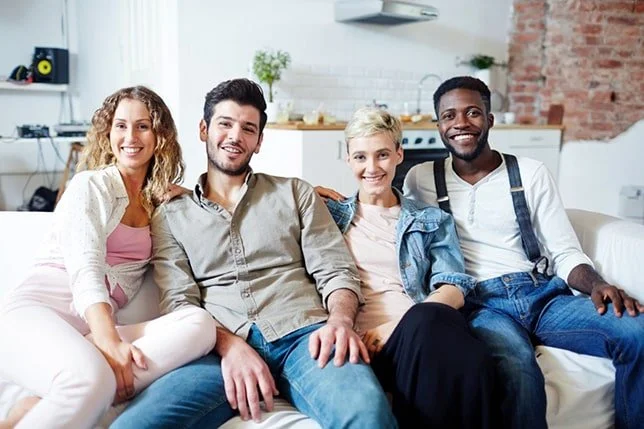
Are you and your partner stuck in a rut?
Couples Therapy
Couples Counselling - the short version
Are you feeling a disconnect in your relationship or stuck in a cycle of the same arguments?
You're not alone—nearly 50% of couples seek therapy at some point. Couples counselling can be a transformative space where you not only improve communication but also rekindle intimacy. Imagine learning how to express your needs clearly, resolving trust issues, or navigating parenting conflicts with ease.
This isn’t a sign of failure; it’s a proactive step toward a more connected and fulfilling partnership.
In therapy, you'll explore the underlying dynamics of your relationship and develop essential skills to communicate better, resolve conflicts, and deepen your emotional bond. Picture this: turning potential arguments into opportunities for growth, rediscovering shared passions, and creating rituals that bring joy back into your lives. If you're ready to build a loving connection and leave feelings of isolation behind, schedule a free consultation with us or fill out the form and we’ll contact you.
Let’s embark on this journey together!
Couples Therapy - the long version
Are you feeling disconnected or unfulfilled in your relationship?
Do certain conversations or arguments happen over and over again without any real changes?
Are you hoping to level up your relationship with better communication and intimacy?
Secure and attached relationships allow us to feel safe and seen. These types of connections don’t just happen by coincidence though. Putting effort into it doesn’t mean that you’re failing - that’s a myth of our culture. Relationships take work, and sometimes seeing a neutral 3rd party (a couples therapist) is an important way to level out big feelings and bring perspective to unhelpful patterns.
Nearly 50% of couples report going to couples therapy at some point in their relationship.
Couples therapy is a valuable resource for partners seeking to strengthen their relationship, overcome challenges, and build a healthier, more fulfilling partnership.
It provides a safe, structured environment where couples can address issues, improve communication, and develop stronger bonds. Seeking professional help isn't a sign of weakness; it's a proactive step towards nurturing your relationship and addressing problems before they become insurmountable.
Here’s how we understand and tailor our therapy for couples approach for our clients.
What is Couples Therapy?
Couples therapy is a form of psychotherapy that focuses on helping partners improve their relationship. It's designed to address specific issues, enhance communication, and provide tools for navigating challenges together. Couples at any stage of their relationship can benefit, whether they're dating, engaged, married, or considering separation.
Typically, sessions involve both partners meeting with a therapist regularly, usually weekly or bi-weekly, for 50-90 minutes. The duration of therapy varies depending on the couple's needs and progress, ranging from a few months to a year or more.
How to Fix a Problem in a Relationship
Common Issues Addressed in
Couples Therapy
Communication Problems
Many couples struggle with effective communication. Common issues include frequent misunderstandings, inability to express needs clearly, or resorting to harmful communication patterns like criticism or stonewalling.
Poor communication can lead to feelings of isolation, resentment, and disconnection. Therapy focuses on teaching active listening skills, expressing emotions constructively, and fostering open, honest dialogue.
Trust Issues
Trust is fundamental to any healthy relationship. Issues can arise from infidelity, dishonesty, or broken promises. When trust is damaged, it can lead to anxiety, suspicion, and a breakdown in intimacy.
Therapy provides a safe space to address betrayals, work through hurt feelings, and develop strategies to rebuild trust gradually.
Intimacy Concerns
Intimacy encompasses both emotional and physical closeness. Couples may struggle with mismatched libidos, lack of emotional connection, or difficulty expressing affection.
These issues can lead to feelings of rejection, loneliness, or dissatisfaction. Therapy helps couples explore the root causes of intimacy problems and develop strategies to reconnect on multiple levels.
Financial Stress
Money matters can significantly strain relationships. Common conflicts include different spending habits, financial infidelity, or disagreements over financial goals.
These issues can lead to frequent arguments and underlying resentment. Therapy can help couples develop a shared financial vision, improve communication about money, and create strategies for managing finances together.
Parenting Conflicts
Parenting disagreements can create tension in even the strongest relationships. This can include differing disciplinary styles, disagreements over child-rearing philosophies, or struggles balancing parenting with couple time.
Therapy can help partners align their parenting approaches, improve co-parenting communication, and find ways to nurture their relationship alongside their parental roles.
Cultural or Religious Differences
Couples from diverse backgrounds may face unique challenges. Differences in cultural expectations, religious practices, or value systems can lead to misunderstandings or conflicts.
Our therapeutic approaches can provide a platform to explore these differences, foster mutual understanding and respect, and find ways to blend diverse backgrounds into a shared life.
Role Expectations
Misaligned expectations about roles within the relationship can cause significant friction. This might involve disagreements about household responsibilities, career priorities, or social obligations.
Therapy helps couples examine their expectations, challenge unhelpful assumptions, and negotiate roles that feel fair and satisfying to both partners.
Decision-Making Conflicts
Couples often struggle with making decisions together, especially for major life choices. This can lead to feelings of powerlessness, resentment, or gridlock.
Therapy, specifically techniques like emotionally-focused couple therapy, can introduce effective decision-making strategies, help couples understand each other's perspectives, and find ways to make choices that honour both partners' needs and values.
Changing Relationship Structure
Whether moving from monogamy to non-monogamy or the other way around — can bring up big emotions, questions, and growing pains. Couples therapy offers a supportive space to navigate these transitions with honesty, curiosity, and care.
Together, partners can unpack fears, clarify boundaries, and strengthen communication while honouring each person’s needs and values. The goal isn’t to choose the “right” structure, but to create one that feels authentic, respectful, and sustainable for everyone involved.
Our Approach to Couples Therapy
Building Stronger Communication
We employ evidence-based techniques to enhance couple communication. These include active listening exercises, "I" statements, and emotional validation practices (through EFT couples therapy techniques).
Improved communication leads to deeper understanding, fewer misunderstandings, and increased emotional intimacy. In therapy, couples practice these skills through structured dialogues and role-playing exercises, gradually incorporating them into daily interactions.
Improve Marital Satisfaction
Our strategies in couples therapy for enhancing relationship satisfaction focus on identifying and nurturing positive interactions. We help couples rediscover shared interests, practice gratitude, and create meaningful rituals.
Therapy can reignite passion by addressing underlying issues and fostering emotional connection. Long-term benefits include increased happiness, reduced conflict, and a more resilient partnership.
Increased Intimacy
We address intimacy issues through a holistic approach, considering both emotional and physical aspects. Techniques include sensate focus exercises, emotional expression workshops, and exploring love languages.
Therapy helps couples reconnect by addressing barriers to intimacy, improving communication about desires and needs, and fostering a safe space for vulnerability. Strong intimacy is crucial for maintaining relationship satisfaction and emotional bonding.
Easier Conflict Resolution
Conflict resolution techniques taught in therapy include time-out strategies, fair fighting rules, and compromise negotiation. These skills help couples address disagreements constructively, reducing emotional escalation and fostering mutual understanding.
Couples learn to apply these skills in daily life, turning potential arguments into opportunities for growth and connection.
Increased Feelings of Trust
Rebuilding trust involves transparency exercises, consistent behaviour changes, and gradual exposure to trust-building situations. We emphasize the importance of reliability, honesty, and emotional safety in maintaining healthy partnerships.
Therapy provides a structured environment for addressing betrayals, processing hurt, and establishing new patterns of trustworthy behaviour.
Smoother Parenting Journey
We help align parenting styles through education about child development, communication exercises specific to co-parenting, and problem-solving strategies for common parenting challenges.
Therapy can help couples navigate issues like discipline consistency, work-life-family balance, and maintaining a couple's identity alongside parental roles. A united parenting front benefits both the couple's relationship and their children's well-being, providing stability and reducing family stress.
Frequently Asked Questions
Shouldn’t my partner and I be able to solve our problems on our own?
The idea that couples should be able to overcome all of their problems without asking for help is a painful and limiting myth. Working with a therapist who provides neutral guidance can allow you to learn and grow together. Your therapist can support you in developing new communication skills and conflict-resolution strategies while strengthening your connection.
I’m worried that our relationship is ending - is couples therapy really worth it?
Part of you might have given up on hope for the future of your relationship - but if you and your partner still care about each other, it’s worth going the extra mile to see if you can heal as a couple. Perhaps there are brighter days ahead, and by committing to couples therapy, you may be able to repair your challenging relationship dynamics.
We are non-monogamous, do you have experience navigating different relationship structures?
We know that it’s not always easy to find someone that has been there or that has the language and experience to help you navigate tricky dynamics in non-monogamy, but consensual non-monogamy is one of the specialties of the couples therapist at Access Therapy.
Whether you’re fresh to the idea of non-monogamy and want help introducing the concept to your primary partner or your multi-person polycule is navigating big life challenges, support is here.
Treatment Approaches for Couples Therapy
Your therapist will design a customized treatment plan based on your unique circumstances and goals as a couple. You’ll each discuss your relationship needs and practice compassionate communication to share these needs with your partner.
To support you along this journey, your therapist will draw techniques from the Gottman Method, which encourages partners to turn towards each other during tough discussions. You’ll learn the art of active listening and try paraphrasing each other’s points of view to limit misunderstandings. Furthermore, you’ll practice granting each other validation when it's needed and being more compassionate, even when conversations get heated.
Your therapist might also use Emotionally Focused Couples Therapy (EFCT) which is a structured approach to couples counselling that focuses on emotions as the key to understanding and improving relationships.
It helps couples identify and address underlying emotions and attachment needs. It explores how attachment styles influence relationship dynamics.
EFT guides couples through a series of stages to create a secure emotional bond. These stages typically involve exploring emotions, reframing interactions, and creating new patterns of communication and responsiveness. The therapy process involves identifying negative patterns (such as criticism or withdrawal), understanding the underlying emotions driving these patterns, and reshaping interactions to foster positive emotional engagement.
You Can Restore Your Loving Connection With Your Partner
You do not have to settle for a dynamic that leaves you both feeling unfulfilled. In couples counselling, you and your partner can nurture a tender, loving connection.
If you and your partner are ready to rebuild your relationship, therapy can help you move forward.
Schedule Your Free Consultation with Access Therapy!
Take the first step towards a stronger, more fulfilling relationship by scheduling your free consultation with Access Therapy. This no-obligation session allows you to discuss your concerns, learn about our approach, and determine if our services align with your needs.
We offer both in-person and online couples therapy, with compassionate therapists who are ready to support you on your journey to a healthier partnership. Schedule your free consultation today!









